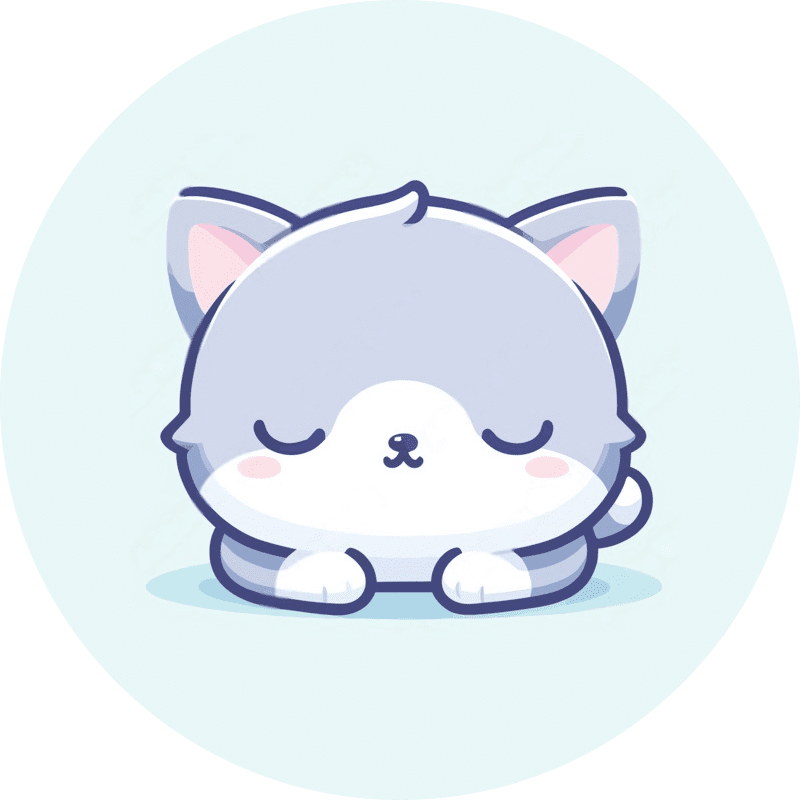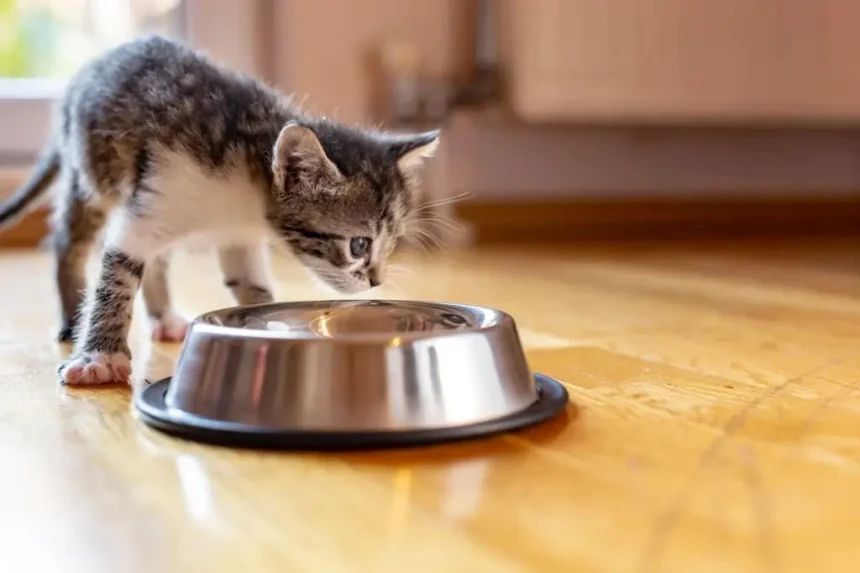Kittens are adorable little creatures that are full of energy and curiosity. However, as a new pet owner, you may have many questions regarding the care and feeding of your new feline friend. One of the most common questions asked by cat owners is whether their 6-week-old kitten can eat dry food.
In this article, we will explore the topic of feeding dry food to 6-week-old kittens. We will discuss the pros and cons of dry food, how to introduce dry food to your kitten’s diet, and the importance of feeding a balanced diet to ensure the overall health and wellbeing of your kitten.
What is Dry Food for Kittens?
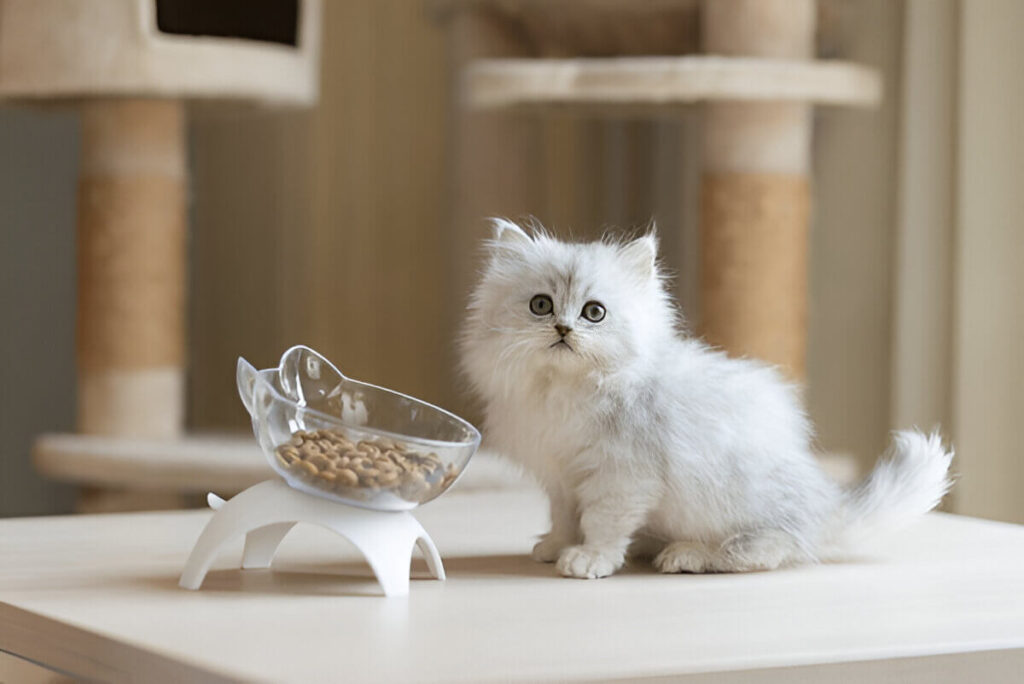
Dry food is a type of cat food that is formulated to be complete and balanced, providing all of the necessary nutrients that a cat needs to thrive. Dry food is typically made up of a mixture of protein sources, such as chicken, fish, or beef, as well as grains, vegetables, and other essential vitamins and minerals.
Dry food is an excellent option for cat owners because it is convenient, cost-effective, and has a long shelf life. Additionally, many cats prefer the crunchiness of dry food, which can help to promote dental health and prevent the buildup of tartar and plaque.
When Can Kittens Eat Dry Food?
Kittens can start eating dry food around 8 to 10 weeks old, though you’ll want to introduce it gradually.
At this stage, kittens are still learning how to chew and digest solid food, so it’s best to soften dry food with a little warm water or kitten formula.
By 12 weeks old, most kittens are ready to eat dry food without needing it softened. However, wet food should still make up a large part of their diet until they’re about 6 months old.
Can 6 Week Old Kittens Eat Dry Food?
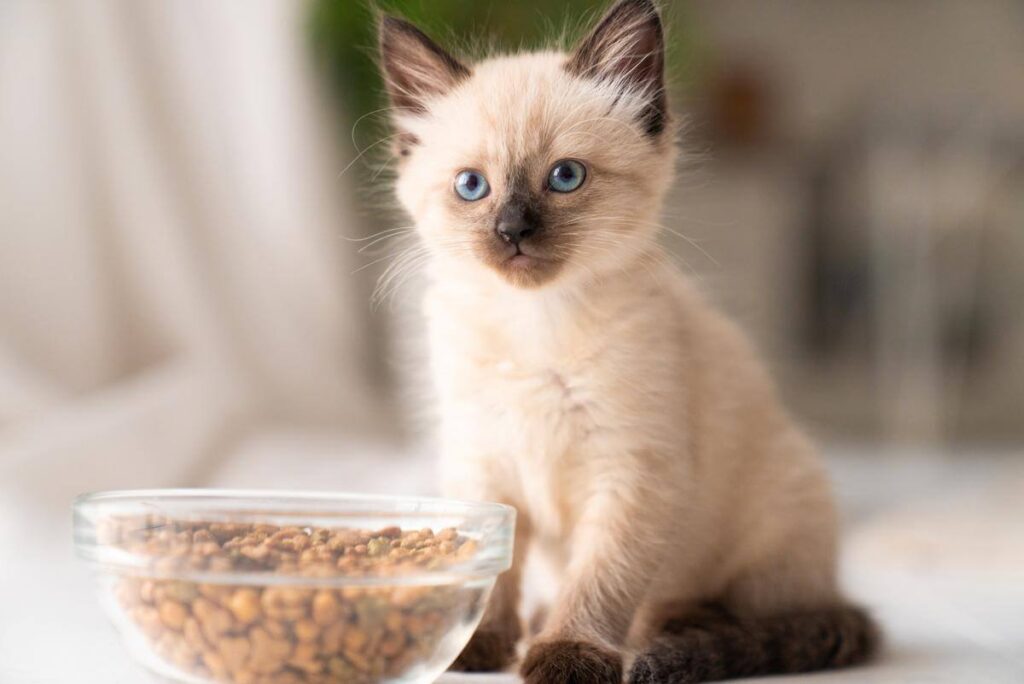
Yes, 6-week-old kittens can eat dry food. However, it is important to note that kittens of this age should not be weaned from their mother or given solid food until they are at least four weeks old.
Kittens rely on their mother’s milk for the first few weeks of their life, as it provides them with the necessary nutrients and antibodies to build a strong immune system. Once a kitten is ready to be weaned, they can begin to eat solid food.
While it’s okay to introduce a bit of dry food, wet kitten food should be their main meal until they’re about 7 to 9 weeks old.
While wet food is often recommended for kittens, as it provides additional moisture and can be easier for kittens to digest, dry food can also be included in their diet.
When introducing dry food to your kitten’s diet, it is important to do so gradually. Start by mixing a small amount of dry food with your kitten’s wet food, gradually increasing the amount of dry food over time. This will allow your kitten to adjust to the new food and prevent any digestive issues.
Pros and Cons of Feeding Dry Food to 6 Week Old Kittens
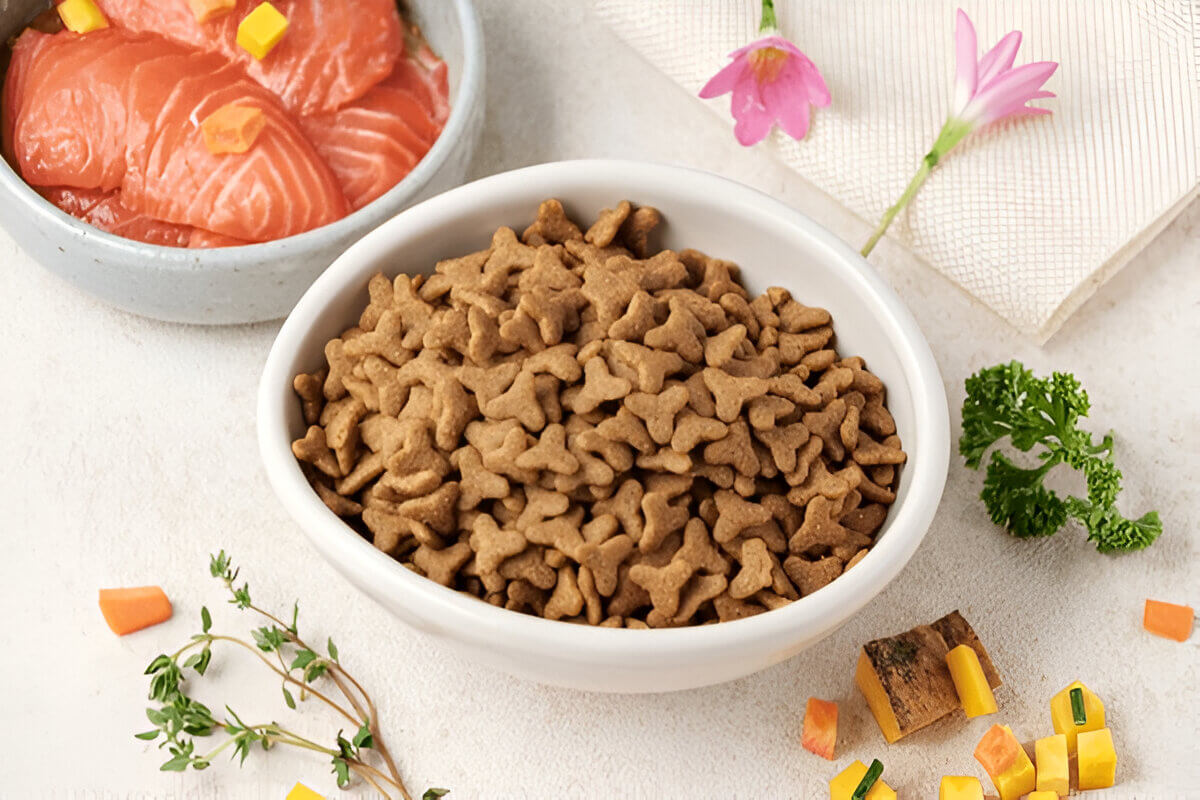
Feeding dry food to 6-week-old kittens has both advantages and disadvantages. Here are some pros and cons to consider:
Pros
Convenience: Dry food is easy to store and serve, making it a convenient option for pet owners.
Cost-Effective: Dry food is often more cost-effective than wet food, which can be especially beneficial for pet owners on a budget.
Dental Health: The crunchy texture of dry food can help to promote dental health by preventing the buildup of tartar and plaque.
Longer Shelf Life: Dry food has a longer shelf life than wet food, which can be useful for pet owners who want to stock up on food.
Cons
Lack of Moisture: Dry food contains very little moisture, which can be problematic for kittens who may not drink enough water.
Digestive Issues: Some kittens may have trouble digesting dry food, which can lead to diarrhea or constipation.
Nutritional Quality: The nutritional quality of dry food can vary, and not all brands provide the necessary nutrients that a kitten needs.
Allergies: Some kittens may be allergic to certain ingredients in dry food, such as grains or certain types of protein.
How Much To Feed Kittens?
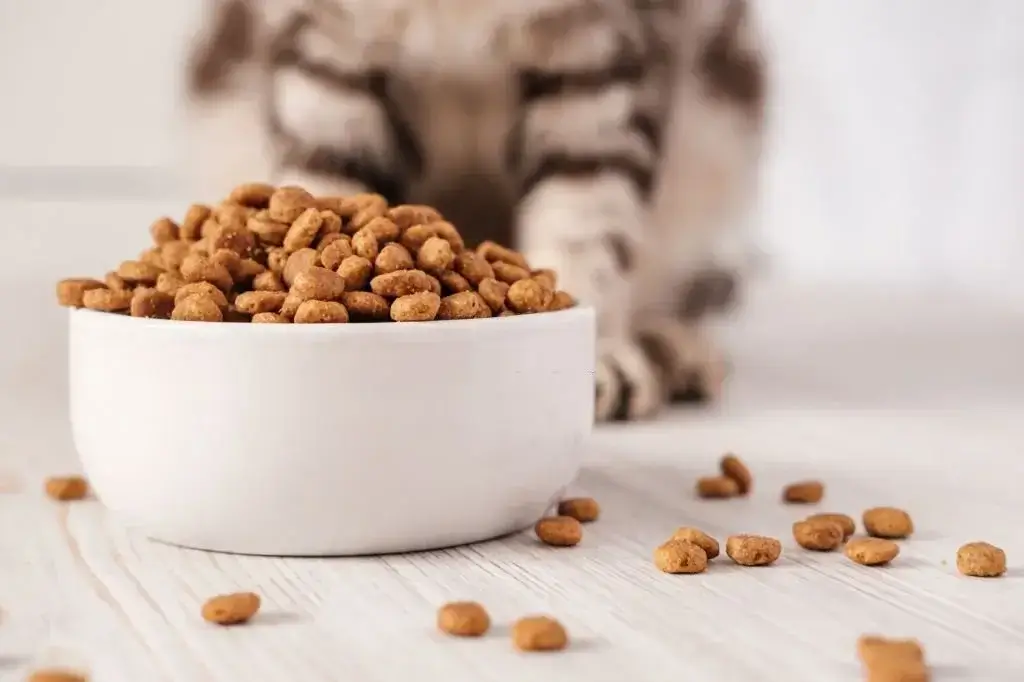
The amount of food a kitten needs depends on their age, weight, and activity level. Here’s a general guide for how much to feed kittens at different stages:
4 to 8 weeks: At this age, kittens are starting to wean off their mom’s milk. You can feed them 3 to 4 small meals a day, offering wet food or softened dry food.
8 to 12 weeks: Kittens are more active and growing fast. They may need 4 meals a day. Offer about 1/4 to 1/2 cup of wet food or the recommended portion of kitten kibble each meal.
12 weeks to 6 months: Kittens are growing quickly at this stage, so they need 3 meals a day. You should feed about 1/2 to 3/4 cup of food per meal, depending on their size and the type of food.
6 months and older: After 6 months, you can usually switch to 2 meals a day. The portion size will depend on your kitten’s specific growth needs, but you’ll likely feed them about 3/4 to 1 cup of food per day.
Always check the feeding guidelines on the food packaging, as they may vary depending on the brand and type of food you choose.
Can 6 Week Old Kittens Eat Solid Food?
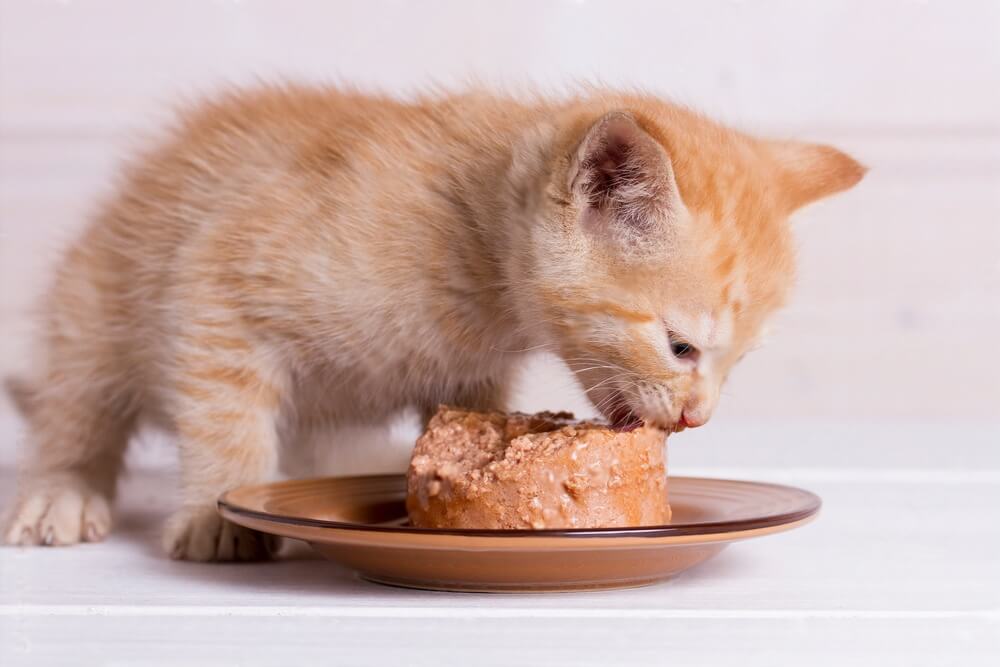
Yes, at 6 weeks, kittens are ready to try solid food, but they should start with wet food. Solid food, like wet kitten food, is soft and easy to chew, which makes it ideal for their still-developing teeth and digestive system. Dry food is a bit harder for them to handle at this stage.
What Happens if a Kitten Eats Dry Food Too Early?
If a kitten eats dry food too early, it could struggle with chewing, causing frustration or even injury to their teeth. Dry food is harder to digest and might upset their stomach or cause constipation. It can also affect hydration since dry food doesn’t provide any moisture, which is essential for kittens.
Will a Kitten Choke on Dry Food?
While choking on dry food is unlikely, it’s still a concern if the kibble is too big or if the kitten doesn’t chew it properly. Wet food is definitely safer at this stage because it’s easier to eat and swallow.
When Do Kittens Start Eating Food and Drinking Water?
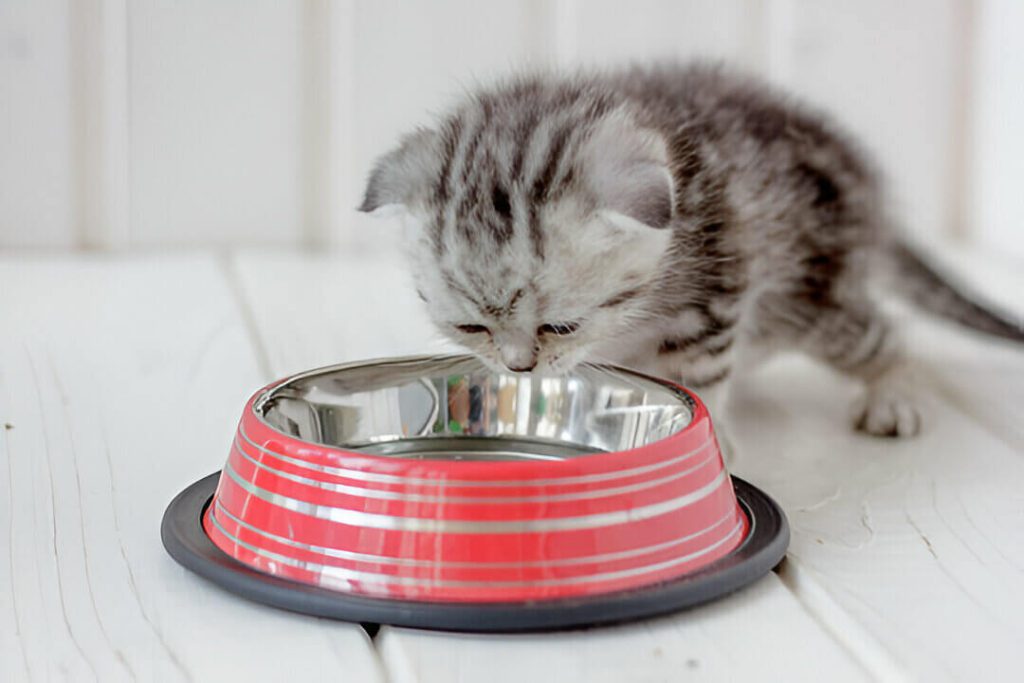
Kittens typically start eating solid food (usually wet food or softened dry food) around 4 to 5 weeks. At this age, they begin to wean off their mother’s milk and start exploring solid foods. They may still nurse or drink kitten formula at this point, but solid food should be introduced gradually.
Drinking water comes a bit later. Kittens will start exploring water around 4 to 5 weeks, but it may take a little time before they understand that they should drink from a bowl. As they transition to more solid food, their need for water increases, so it’s important to keep fresh water available at all times.
When Can Kittens Eat Dry Food Only?
Kittens can start eating dry food only once they’re about 12 weeks old and have fully transitioned to solid food.
At that point, their digestive systems and teeth are developed enough to handle dry food without the risk of digestive upset or dental issues.
Tips for Feeding Dry Food to 6-Week-Old Kittens
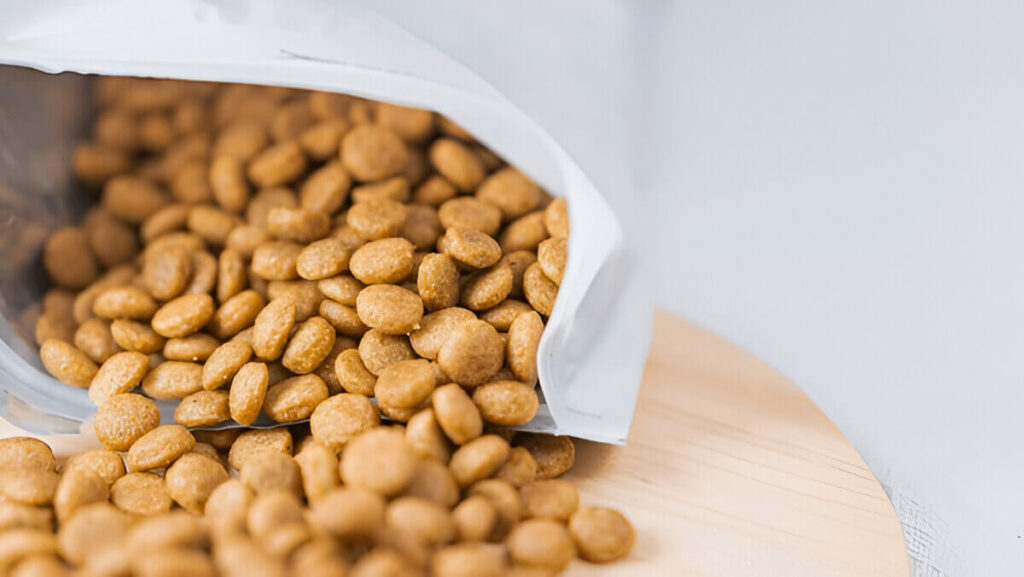
If you decide to feed your 6-week-old kitten dry food, there are a few tips to keep in mind to ensure their health and wellbeing.
Choose a high-quality brand
When selecting dry food for your kitten, it is important to choose a high-quality brand that is formulated specifically for kittens.
Look for a brand that lists meat as the first ingredient, and avoid brands that contain fillers, such as corn or wheat.
Monitor your kitten’s water intake
Because dry food contains very little moisture, it is important to monitor your kitten’s water intake to ensure they are drinking enough.
Provide fresh, clean water at all times and consider using a water fountain or adding water to their food to increase their moisture intake.
Introduce the food gradually
As mentioned earlier, it is important to introduce dry food to your kitten’s diet gradually.
Start by mixing a small amount of dry food with their wet food, gradually increasing the amount of dry food over time.
Pay attention to your kitten’s behavior
Keep an eye on your kitten’s behavior after introducing dry food to their diet. If they experience any digestive issues, such as diarrhea or constipation, it may be necessary to adjust their diet or consult with a veterinarian.
Feed a balanced diet
Whether you choose to feed your kitten wet or dry food, it is important to provide them with a balanced diet that contains all of the necessary nutrients they need to grow and develop.
Look for food that is labeled as complete and balanced, and avoid feeding your kitten table scraps or other human food.
What To Feed Kittens?
When feeding kittens, it’s important to choose food that meets their nutritional needs. Here’s what you should feed your kitten:
Kitten Milk Replacement
If your kitten is orphaned or you’re weaning them, kitten milk replacer is essential. Never feed regular cow’s milk to kittens, as it can upset their stomachs.
Kitten-Specific Food
Always choose kitten-formulated food (wet or dry), as kittens have different nutritional requirements than adult cats. Kitten food is higher in calories, protein, and fat to support their rapid growth and development.
Wet Food
Wet kitten food is highly recommended because it provides hydration and is easier for kittens to eat and digest. It’s great for kittens who are still getting the hang of eating solids and can help with their hydration needs.
Dry Food
While dry food can be introduced at 8 to 10 weeks, it should not be the main source of food until they are older. Dry food is harder for kittens to digest and doesn’t provide the hydration that wet food does.
Kitten Dry Food: What’s Best?
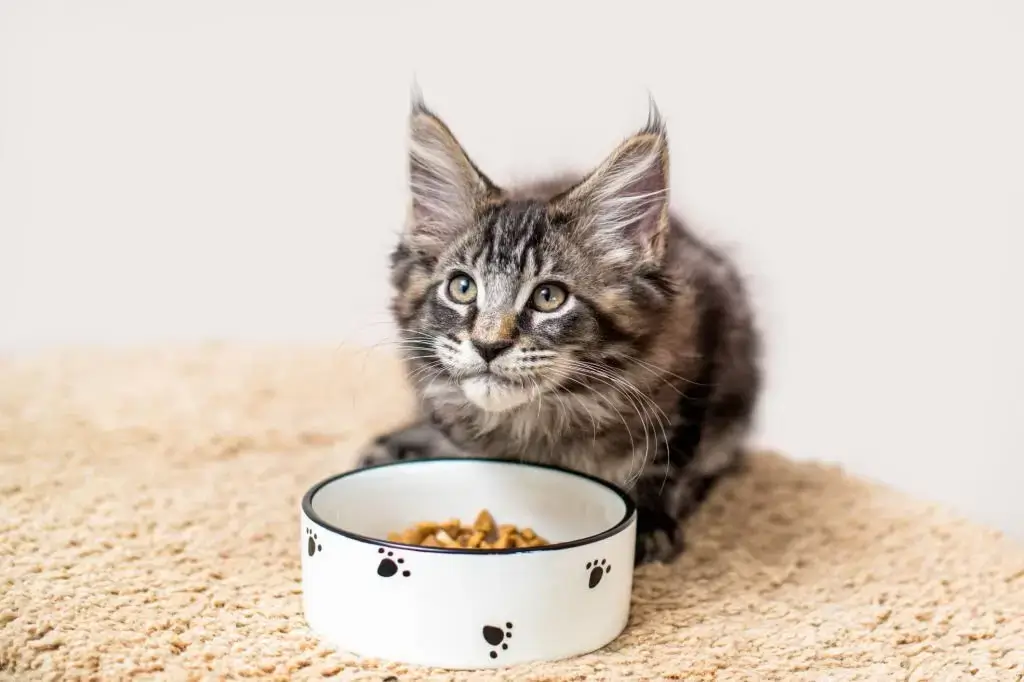
When choosing dry food for kittens, look for options specially formulated for kittens. These foods are higher in calories, protein, and fat—everything your kitten needs to grow strong and healthy. Brands like Hill’s Science Diet, Royal Canin, and Blue Buffalo offer great options.
Best Dry Food for Kittens
The best dry food for kittens should contain quality protein like chicken, turkey, or fish. It should also have a balance of fats and carbohydrates for energy. Look for kitten-specific food (not adult cat food) to ensure they get the right nutrients. Popular brands include:
Hill’s Science Diet Kitten
Royal Canin Feline Health Nutrition Kitten
Blue Buffalo Healthy Growth Kitten
What Happens If My Kitten Eats My Older Cat’s Food?
If your kitten eats your older cat’s food, don’t panic! But it’s not ideal.
Adult cat food isn’t as calorie-dense or nutrient-rich as kitten food. Kittens need more calories, protein, and fat to support their rapid growth, and adult food can be too low in these essential nutrients.
Long-term, feeding kitten food is a must for their development. If it happens occasionally, though, it won’t be a big issue. Just make sure your kitten has its own proper food to munch on regularly.
Can 4-Week-Old Kittens Eat Dry Food?
At 4 weeks old, kittens are typically still nursing or on kitten formula and are not ready for dry food yet. Their digestive systems and teeth aren’t developed enough to handle it.
By 6 weeks, you can start introducing soft wet food and a bit of softened dry food, but 4-week-old kittens should stick to liquid food sources.
Can a 5-Week-Old Kitten Eat Dry Food?
A 5-week-old kitten can start trying dry food, but it should be softened with a bit of warm water or kitten formula. Kittens at this age still need the nutrients and moisture from wet food, so dry food shouldn’t be the primary part of their diet.
Can Cats Eat Dry Food at 6 Weeks?
At 6 weeks old, kittens can technically start trying dry food, but it’s not the best choice as their primary meal.
Kittens at this age are still transitioning from their mom’s milk (or kitten formula) to solid food. Dry food can be tough on their tiny teeth and is harder for their stomachs to digest compared to wet food.
While it’s okay to introduce a bit of dry food, wet kitten food should be their main meal until they’re about 7 to 9 weeks old.
Conclusion
Can 6 week old kittens eat dry food? Yes, but it is important to introduce it gradually and monitor their water intake and behavior.
While dry food has several advantages, such as convenience and dental health benefits, it also has some potential disadvantages, such as a lack of moisture and the possibility of digestive issues.
As a pet owner, it is important to choose a high-quality brand of dry food that is specifically formulated for kittens, provide fresh water at all times, and pay attention to your kitten’s behavior and overall health.
By providing your kitten with a balanced diet and the necessary nutrients, you can ensure their overall health and wellbeing as they grow and develop into adult cats.
